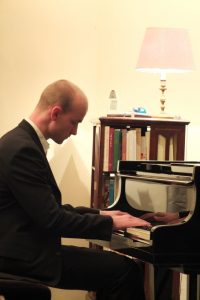Principles of Piano Education by Sulamita Aronovsky: Multi-Traditionalism in the Art of Performance
Doctoral student: Mantautas Katinas
Supervisors: Prof. Petras Geniušas, Prof. Habil. Dr. Leonidas Melnikas
Department: Piano
Intended duration: 2015–2019
Abstract
Sulamita Aronovsky is a piano professor at the Royal Academy of Music, the Founder and Artistic Controller of the London International Piano Competition. Her students have won over fifty prizes in international competitions, including first prizes at the Arthur Rubinstein International Piano Master Competition, the Maria Canals Competition, the Robert Casadesus International Piano Competition and the Gina Bachauer International Piano Competition. Following her graduation from the Lithuanian State Conservatoire in Vilnius, she completed her postgraduate studies at the Moscow Conservatoire, where she studied with such eminent pianists as Alexander Goldenweiser, Grigory Ginzburg and Abram Shatzkes. Between 1956 and 1970 she was a piano professor at the Lithuanian State Conservatoire. Since 1971 her activities have embraced various fields of musical life in the United Kingdom and abroad.
The present artistic research project aims to prove an assumption that Aronovsky has created an individual style of piano education, and that multi-trationalism is one of its core elements. The research, based on various sources of music theory and history, forms a theoretical base for the phenomenon of multi-traditionalism and its impact on the traditions of the art of piano playing. One of the chapters of the thesis is devoted to the role the time and place played in a historical evolution of musical performance in the 20th century and its reflections in the professional life of Aronovsky. The paper also introduces and explores the principles of the development of knowledge and skills of piano performance in the pedagogical life of Aronovsky.


